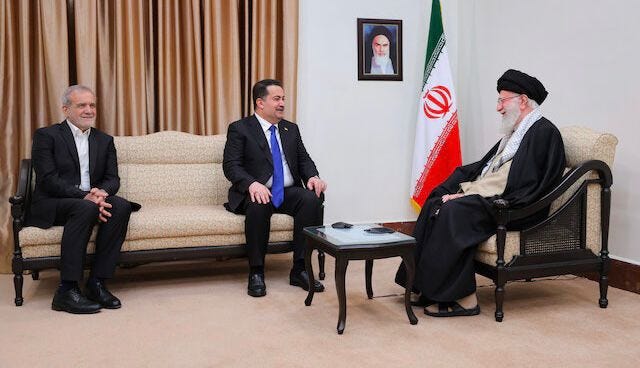Amid a Crisis in the Resistance Axis, Iraqi PM's Visit to Iran Aims to Tackle Regional Challenges
Iraqi Prime Minister Muhammad Shia al-Sudani paid a significant visit to Tehran amidst the ongoing crises facing Iran and its regional allies, with Iraq playing a pivotal role in this dynamic.
Iraq's Role in Iran’s Network
Iran maintains a robust alliance with Iraqi militias within the Popular Mobilization Units (PMU), which boast over 200,000 fighters and substantial military capabilities. These militias have played a critical role in Iran’s regional strategy, including targeting Israel following the events of October 7, 2023, as well as during the unrest in Syria. Additionally, they have been instrumental in combating U.S. forces, not only within Iraq but across the broader region.
Iraq plays a crucial role in economically supporting Iran, especially as Tehran struggles under the weight of severe sanctions imposed by the United States and its allies. This support is facilitated through a variety of means, including trade partnerships, financial transactions, and the flow of goods and resources. Iraq has become a key market for Iranian exports, ranging from energy supplies and agricultural products to industrial goods, which help sustain Iran's economy despite international restrictions. Additionally, informal networks and cross-border trade often allow Iran to circumvent sanctions, with Iraq acting as a critical conduit. The strong economic ties between the two countries not only bolster Iran’s resilience but also deepen their interdependence, further cementing Iraq’s strategic role within Iran’s broader regional framework.
Sudani's Agendas
1- PMU Issue: Iraq has faced significant pressure from the United States to rein in the Popular Mobilization Units (PMU), integrating them fully into state forces under the Prime Minister’s command. The U.S. has urged limits on the PMU's operational capacity and influence, cutting their direct ties with Iran, and halting their attacks on Israel and U.S. bases across the region.
The situation became more delicate following a major blow to Iran’s proxy network with the killing of Sayyed Hassan Nasrallah and dozens of Lebanese Hezbollah leaders, as well as Israeli attacks on Tehran. In response, the PMU ceased their campaign against Israel and avoided involvement in Syria to prevent further escalation with Israel or the United States.
During his visit to Tehran, Prime Minister Sudani discussed these pressing matters with Iranian officials. He urged them to assist in preventing any uncoordinated or rogue actions by the PMU that could provoke Israel or the U.S., potentially making Iraq a target. Sudani emphasized the need to maintain stability and shield Iraq from becoming embroiled in further regional tensions, highlighting the importance of managing PMU activities to avoid unforeseen developments.
2- Iraq’s Role in Regional Mediation: Iraq has played a pivotal role in mediating between Iran and its Arab rivals, particularly Saudi Arabia, Jordan, Egypt, and Bahrain. These efforts have largely been successful, fostering a degree of rapprochement and easing regional tensions. Building on this momentum, Iraq is now seeking to mediate between Iran and Syria to address the growing strain between the two countries following the fall of Bashar al-Assad's regime.
During his visit to Tehran, Prime Minister Sudani proposed holding a regional conference in Baghdad, bringing together key regional players, including Iran and Syria. The objective of this conference would be to integrate Iran more deeply into the regional framework and to de-escalate ongoing tensions. Sudani emphasized that without proactive measures, these tensions could spill over into Iraq, potentially turning it into a battleground. By positioning Iraq as a mediator, the country seeks to prevent further instability and strengthen its role as a regional stabilizer while protecting its sovereignty and security.
3- Iran Gas and Electricity: Iraq is facing significant challenges in paying for the gas and electricity it imports from Iran. To circumvent these difficulties, Iraq has explored various methods, including purchasing humanitarian goods for Iran. However, these approaches have proven limited and insufficient to fully transfer Iran's owed funds from Baghdad to Tehran.
To address this, Baghdad reached an agreement with Turkmenistan for a gas swap via Iran. Under this arrangement, Iraq will purchase gas from Turkmenistan and pay them directly. Turkmenistan, in turn, will supply gas to northern Iran, while Iran provides Iraq with an equivalent amount of gas from its southern fields.
Such innovative measures are especially crucial as Iran itself struggles with gas and electricity shortages. Additionally, with the potential return of Donald Trump to the White House and the likely tightening of sanctions on Iran, these arrangements offer a way for Iraq to maintain its energy needs while mitigating the risk of disruptions in trade with Iran.
Iran’s Response
Iran’s response to Prime Minister Sudani’s visit and his proposed agendas reflects both pragmatism and strategic interest. Tehran acknowledged the significance of Iraq’s mediation efforts, viewing Baghdad as a vital partner in navigating regional challenges. Iran welcomed Sudani’s proposal for a regional conference in Baghdad, recognizing its potential to enhance its regional standing and address tensions with Syria while countering isolation.
On the issue of the Popular Mobilization Units (PMU), Iran showed willingness to collaborate with Iraq in managing the militias’ activities to avoid direct confrontation with Israel and the United States, signaling a calculated approach to preserving its influence while maintaining stability.
Regarding economic matters, Iran viewed the innovative gas-swap agreement with Turkmenistan as a pragmatic solution to the challenges posed by sanctions, underscoring the importance of sustaining its energy trade with Iraq. Tehran's engagement with these proposals demonstrates its intent to strengthen ties with Baghdad and leverage Iraq’s mediatory role to safeguard its regional interests during a period of heightened economic and geopolitical pressure.


